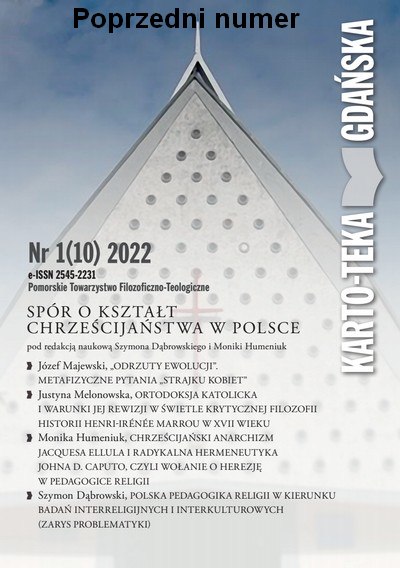The Art of Ethics as the Art of Wise Life in the Concept of Józef Tischner
DOI:
https://doi.org/10.26881/kg.2022.1.07Keywords:
technological ethics, art of ethics, art of life, encounter, human matter, the other, Józef TischnerAbstract
The article examines Tischner’s views on the meaning of ethics in human life. Tischner opposes positions that treat ethics as a set of recommendations (commands and interdictions). He believes that such an approach amounts to a kind of training in which the final effect is most important and, what is more, imposed. According to Tischner, a man’s attitude towards his activity is what is important. Therefore, first we should ask who the person is and what his good is.
Tischner does not give precise answers to these questions. He notes that self-awareness is not given to man from the beginning but is shaped throughout his life. Its course is influenced by his upbringing, education and life circumstances. Tischner points out that the most important of those are interpersonal relations. In an encounter one man helps another to discover what is good.
Ethics is precisely the art of accurate revelations of the good. It is also the art of planning and undertaking activities that ensure that the good is preserved. Ethics is also an art because every encounter is different and, therefore, unique.
Downloads
References
Dymarski Z., Wewnętrzna przestrzeń wolności a sprawa człowieka, „Paedagogica Christiana” 2018, nr 1, s. 81–96.
Dymarski Z., Tischnerowska koncepcja kuszenia, w: Aktualność Tischnera, red. M. Piaskowska-Majzel, P. Kołodziński, CDiDN, Szczecin 2008, s. 21–37.
Heidegger M., Bycie i czas, tłum. B. Baran, PWN, Warszawa 1994.
Heidegger M., List o ‘humanizmie’, w: M. Heidegger, Znaki drogi, tłum. J. Tischner, Aletheia, Warszawa 1999, s. 271–312.
Kołakowski L., Etyka bez kodeksu, w: L. Kołakowski, Kultura i fetysze, PWN, Warszawa 2000, s. 137–173.
Mounier E., Personalizm. Przystępne wprowadzenie do osoby, w: E. Mounier, Wprowadzenie do egzystencjalizmów, tłum. E. Krasnowolska, Biblioteka Więzi, Warszawa 1964, s. 7–19.
Platon, Obrona Sokratesa, w: Platon, Dialogi, tłum. W. Witwicki, Wydawnictwo Antyk, Kęty 1999, s. 539–583.
Tischner J., Myślenie według wartości, Znak, Kraków 1982.
Tischner J., Sztuka etyki, w: J. Tischner, Myślenie według wartości, Znak, Kraków 1981, s. 363–373.
Tischner J., Etyka wartości i nadziei, w: J. A. Kłoczowski, J. Tischner, Wobec wartości, W drodze, Kraków 2001, s. 9–134.
Tischner J., Sprawa osoby – wstępne przybliżenie, „Logos i Ethos” 1992, nr 2, s. 5–19.
Tischner J., Filozofia dramatu, Éditions du Dialogue, Paryż 1990.
Tischner J., Spór o istnienie człowieka, Znak, Kraków 1998.
Wildiers N. M., Obraz świata a teologia od średniowiecza do dzisiaj, tłum. J. Doktór, PAX, Warszawa 1985.

 Academic Scientific Journals
Academic Scientific Journals

